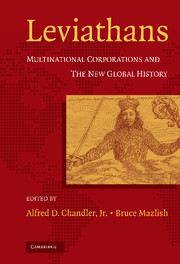Book contents
- Frontmatter
- Contents
- List of Figures and Tables
- Acknowledgments
- List of Contributors
- Introduction
- PART ONE THE SCOPE OF THE MULTINATIONAL PHENOMENON
- PART TWO CULTURAL AND SOCIAL IMPLICATIONS OF MULTINATIONALS
- 5 The Social Impacts of Multinational Corporations: An Outline of the Issues with a Focus on Workers
- 6 A Global Elite?
- PART THREE THE GOVERNANCE OF MULTINATIONALS
- Conclusion
- Index
5 - The Social Impacts of Multinational Corporations: An Outline of the Issues with a Focus on Workers
Published online by Cambridge University Press: 17 August 2009
- Frontmatter
- Contents
- List of Figures and Tables
- Acknowledgments
- List of Contributors
- Introduction
- PART ONE THE SCOPE OF THE MULTINATIONAL PHENOMENON
- PART TWO CULTURAL AND SOCIAL IMPLICATIONS OF MULTINATIONALS
- 5 The Social Impacts of Multinational Corporations: An Outline of the Issues with a Focus on Workers
- 6 A Global Elite?
- PART THREE THE GOVERNANCE OF MULTINATIONALS
- Conclusion
- Index
Summary
Multinational corporations (MNCs) are in many ways the world's most powerful economic actors. As of 2000 there were only 44 nations in the world whose gross domestic product (GDP) was larger than the value-added of any single MNC. Twenty-nine corporations are included in the list of the world's 100 largest economies. ExxonMobil (number 45 on the list) outranks Pakistan (number 46); General Motors (number 47) is larger than Peru, Algeria, New Zealand, the Czech Republic, and the United Arab Emirates – the next six on the list.
In making such comparisons it is important to remember that corporations, compared with nations, focus on a smaller number of goals, which, by many accounts, they pursue more effectively. It is not only the size of MNCs but their orientation and effectiveness that make it critical to understand how the interests of MNCs align with – and where they diverge from – the interests of the rest of society. This chapter will examine, in particular, the ways in which MNCs affect the life experience of workers: those that they employ directly and workers who are significantly affected by spillover effects of these firms.
Here we consider the last three decades of the 20th century. This was a period of particular significance for new global history, for a great spurt of “multinationalization” began and continued throughout these 30 years.
THE ISSUE OF COMPETITION
A specter is haunting the globe – the specter of perfect competition.
- Type
- Chapter
- Information
- LeviathansMultinational Corporations and the New Global History, pp. 135 - 166Publisher: Cambridge University PressPrint publication year: 2005
- 3
- Cited by



